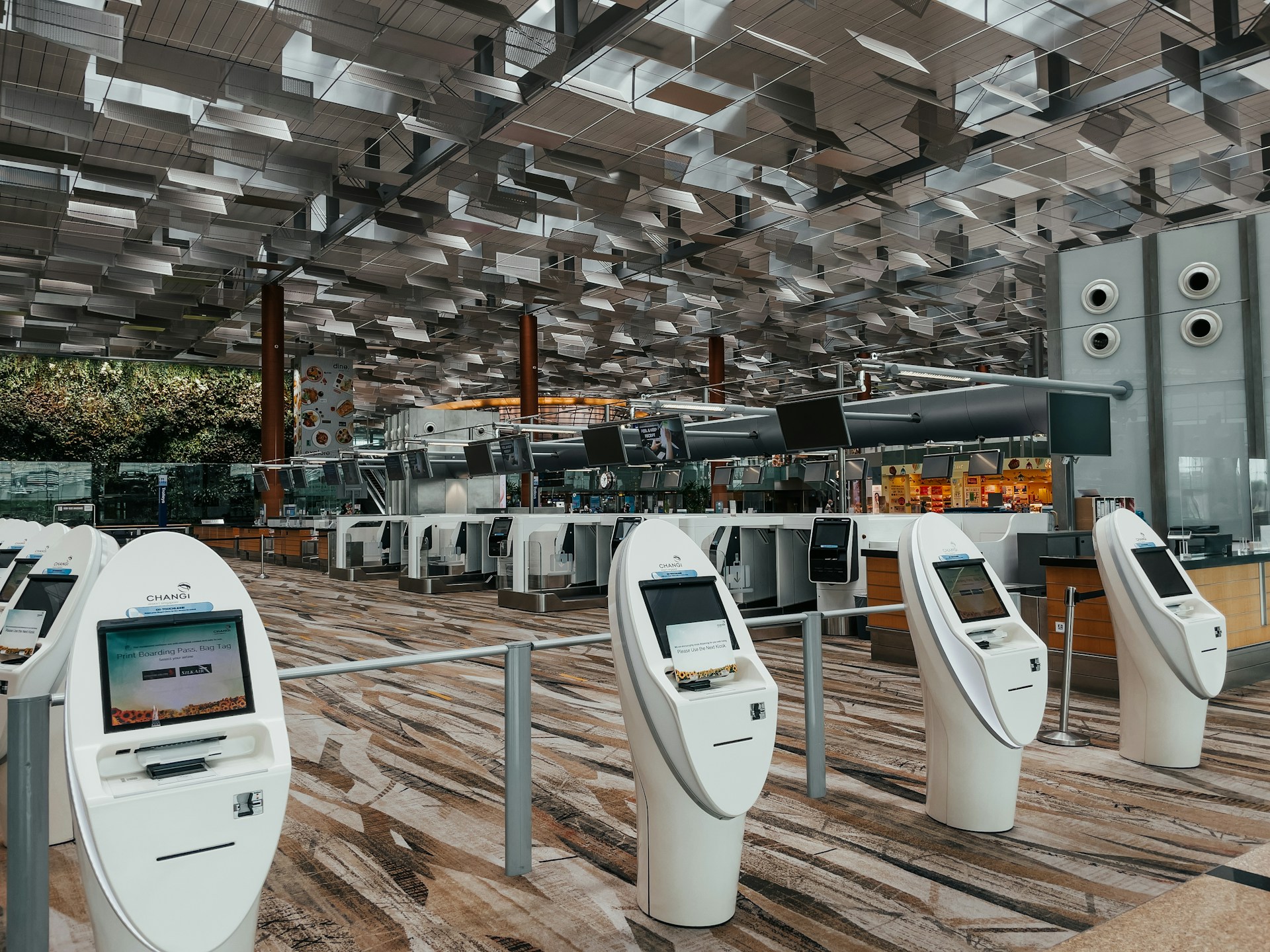Managing visitor data responsibly is a legal requirement for organisations across the UK. With GDPR firmly established as the country’s data protection framework, collecting and storing personal information comes with strict obligations. Yet many workplaces still rely on paper-based methods for tracking visitors, which can lead to data exposure, inaccurate records, and compliance failures.
Organisations that process visitor information – including names, company details, arrival and departure times – must ensure this data is handled securely, transparently, and lawfully. A kiosk based visitor management system offers an effective way to achieve these standards. By digitising the sign-in process, businesses can control access to personal data, present privacy notices, and maintain accurate visitor logs that comply with GDPR.
This article explores how digital kiosks help businesses across the UK stay compliant, reduce risk, and improve visitor experiences – all while presenting a professional and secure front-of-house.
Table of Contents
- Understanding GDPR and Why It Affects Visitor Management
- How Kiosk Based Visitor Management Systems Enable GDPR Compliance
- Supporting Wider Compliance and Regulatory Needs
- Identifying the Risks of Non-Compliance with Manual Systems
- What to Look for in a GDPR Compliant Kiosk Based Visitor Management System
- How to Maintain Ongoing Compliance
- Conclusion: The Smartest Way to Stay Compliant
- Kiosk Visitor Management System FAQs
Understanding GDPR & Why It Affects Visitor Management
GDPR, which came into effect in 2018, is the UK’s core data protection legislation. It governs how personal data is collected, stored, processed, and erased. Under GDPR, personal data includes any information that can identify a person – such as names, signatures, photographs, and the organisations they represent.
At the front desk, this means every visitor interaction can constitute a data processing event. Whether a contractor signs in for a maintenance job or a delivery driver drops off a parcel, the details you collect are subject to GDPR. Businesses are required to ensure that this data is processed lawfully, transparently, and securely, while also granting individuals rights over their information.
Manual visitor logs often fall short of these standards. They’re difficult to secure, expose previous entries to other visitors, and offer no simple way to erase or retrieve data. A kiosk based visitor management system resolves these issues by digitising the entire process and building compliance into every interaction.
How Kiosk Based Visitor Management Systems Enable GDPR Compliance
The benefits of adopting a kiosk based visitor management system go well beyond convenience. These systems are designed with privacy in mind and are equipped with features that directly support GDPR compliance across several core principles.
Transparency & Informed Consent
Under GDPR, individuals must be informed about what data is being collected, why it is needed, and how it will be used. Our kiosks display customisable privacy notices at the start of the check-in process, clearly outlining your data policy and allowing visitors to provide explicit consent before proceeding. This ensures that all data collection is lawful and transparent, satisfying Articles 5 and 6 of the GDPR.
Data Minimisation & Purpose Limitation
The principle of data minimisation states that you should only collect information that is strictly necessary. Our systems allow you to tailor data capture forms based on visitor type, ensuring you’re not gathering unnecessary details from guests, employees, or contractors. You can configure different workflows depending on the visit purpose, so you’re only collecting relevant data that directly supports your operational needs.
Accuracy & Data Integrity
Visitor information is entered directly by the individual via the kiosk interface, reducing errors and misinterpretations that can occur with handwritten logs. This self-service approach ensures greater data accuracy while allowing for real-time updates and host notifications when required.
Right to Access, Rectification and Erasure
GDPR grants individuals the right to request access to their data, have it corrected, or deleted entirely. With a manual sign-in book, fulfilling these requests can be almost impossible without breaching other visitors’ privacy. In contrast, our digital system allows administrators to quickly locate individual records and action data subject requests efficiently and securely, without affecting other entries.
Secure Storage & Access Controls
All data collected through our kiosks is stored securely, encrypted both in transit and at rest. Access is role-based, ensuring that only authorised personnel – such as data controllers or reception managers – can view or edit sensitive records. We also offer on-premise and cloud storage options depending on your organisational policy.
Automatic Data Retention Settings
Data should not be kept longer than necessary. Our kiosk system features automated data retention tools, allowing you to set rules for automatic deletion after a specified period – whether that’s 30, 60, or 90 days. This helps you avoid accumulating outdated information and ensures that your business adheres to Article 5(e) of GDPR, which governs storage limitation.
Audit Trails & Reporting
Should your organisation ever be subject to an audit or investigation, maintaining a detailed log of who entered your site and when can prove invaluable. Our system automatically logs all visitor data, generating time-stamped audit trails that can be retrieved on demand. These logs help demonstrate your compliance efforts and provide evidence in the event of a dispute or data breach enquiry.
Supporting Wider Compliance & Regulatory Needs
While GDPR is the cornerstone of data protection law in the UK, it’s not the only compliance consideration for businesses. Our visitor management kiosk systems also support other regulatory frameworks, including fire safety regulations, ISO 27001, and industry-specific standards for sectors such as education, healthcare, and finance.
For example, in the event of an evacuation, our system can instantly generate an up-to-date fire roll call, listing all visitors, contractors, and staff currently on-site. This contributes directly to your health and safety obligations and provides reassurance that everyone is accounted for during emergencies.
In addition, organisations working towards or maintaining ISO 27001 accreditation will benefit from our system’s robust access controls, secure data handling, and traceable logs – features that align closely with the standard’s requirements for information security.
Identifying the Risks of Non-Compliance with Manual Systems
Relying on paper sign-in methods might seem harmless, but it exposes businesses to a wide range of compliance risks. Visitor logbooks can be misplaced, copied, photographed, or accessed by unauthorised individuals. It’s also practically impossible to fulfil erasure or access requests without compromising the data of others.
Moreover, if a data breach were to occur – either through loss or exposure of manual records – the organisation could face fines of up to £17.5 million or 4% of global turnover under UK GDPR legislation. Equally concerning is the reputational damage that often follows a breach, which can have long-term consequences for customer trust and staff morale.
Investing in a digital kiosk is not just a technological upgrade – it’s a necessary step toward risk reduction, legal protection, and modern visitor engagement.
What to Look for in a GDPR-Compliant Kiosk Based Visitor Management System
Not all digital systems are created equal. To ensure your visitor management solution supports full GDPR compliance, it should include the following capabilities:
Privacy Notices & Informed Consent
A GDPR-compliant system must present a clear, customisable privacy notice at the start of the sign-in process. It should explain what personal data is collected, why it’s needed, how it will be used, and offer visitors the ability to give or withhold consent.
Data Minimisation & Purpose Limitation
Your system should allow custom fields based on visitor type (e.g., guests, contractors, staff) so that only relevant data is collected. This supports GDPR’s principle of collecting only what’s necessary for a specific purpose.
Access, Rectification & Erasure Requests
Your kiosk should enable easy retrieval, modification, or deletion of visitor records to support subject access requests under GDPR – without compromising other users’ data.
Secure Data Storage & Access Controls
The system must store visitor data securely, using encryption both in transit and at rest. Role-based access ensures only authorised personnel (e.g., reception or compliance officers) can view or manage sensitive information.
Automated Data Retention Policies
Ensure the system can auto-delete visitor data after a configurable retention period (e.g., 30, 60, or 90 days). This reduces unnecessary data storage and aligns with GDPR’s storage limitation principle.
Detailed Audit Trails & Reporting
For regulatory audits or internal reviews, a good kiosk system should automatically log all visitor entries with timestamps. These audit trails help demonstrate GDPR compliance and can be crucial during investigations.
Emergency & Compliance Reporting Tools
In addition to GDPR, your system should support wider compliance needs, like generating real-time evacuation reports or aligning with ISO 27001 and other industry-specific standards.
At InVentry, we’ve developed our visitor management kiosk with all of these features in mind, based on input from UK data protection officers, compliance teams, and IT security specialists.
How to Maintain Ongoing Compliance
Implementing a kiosk based visitor management system is the first step – keeping it compliant is an ongoing responsibility. It’s essential to review your data collection policies regularly, train front desk and security staff on privacy best practices, and stay informed about updates to data protection law. We advise businesses to conduct internal audits at least annually and ensure your chosen solution evolves in line with legal developments.
InVentry provides regular system updates, ongoing support, and compliance guidance to help you stay ahead of changes and ensure your visitor process remains legally sound.
Conclusion: The Smartest Way to Stay Compliant
As data privacy expectations continue to rise, businesses can no longer afford to treat visitor sign-in as an afterthought. An electronic visitor sign-in kiosk is a smart, scalable way to modernise your front desk operations while aligning with GDPR and other legal obligations.
At InVentry, we understand the pressure UK businesses face to remain compliant, secure, and professional. Our Kiosk based visitor management system has been carefully engineered to meet these needs, giving you full control over how visitor data is handled and providing a seamless experience for your guests.
Whether you’re looking to replace outdated processes or want a solution built for compliance from the ground up, our team is here to help you navigate the future of visitor management.
Kiosk Based Visitor Management System FAQs
What are the benefits of using a digital kiosk-based system over a manual logbook?
This system speeds up the check-in process, enhances facility security, sends real-time notifications to hosts, maintains digital visitor records, supports badge printing, and offers a more hygienic, contactless experience.
How does the visitor check-in process work at the kiosk?
A visitor approaches the kiosk, enters their personal details, selects the person they are meeting, signs any required forms, receives a visitor badge if needed, and the host is notified immediately.
Is the system secure and compliant with privacy laws (e.g. GDPR)?
Reputable systems use encryption and adhere to data privacy laws such as GDPR or HIPAA. They offer features like data retention controls and automatic data deletion policies.
How is data stored and protected?
Data is stored securely using encryption and access controls, either in the cloud or on local servers, depending on the setup. Regular backups and compliance features ensure data safety.




